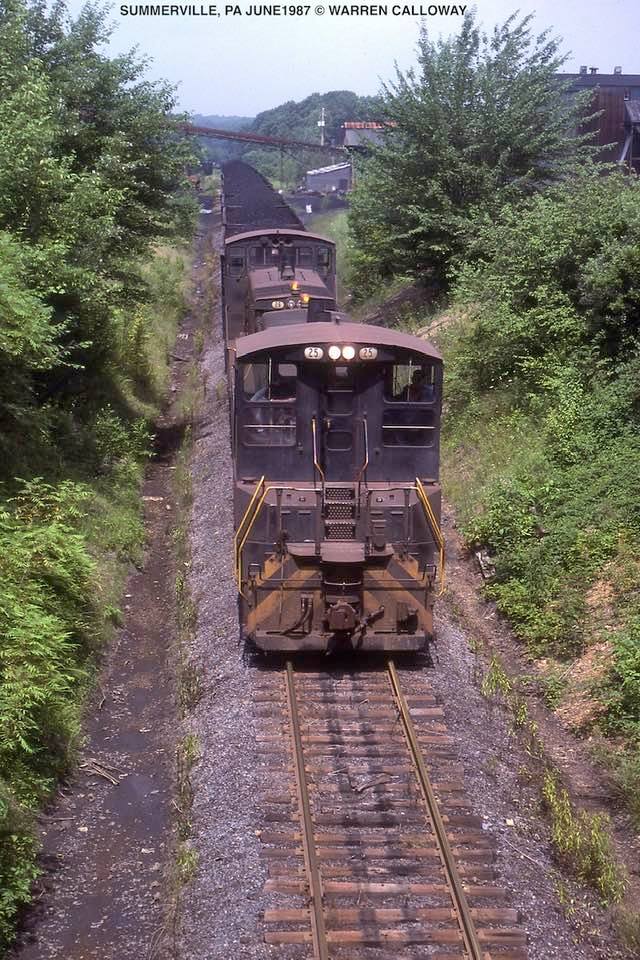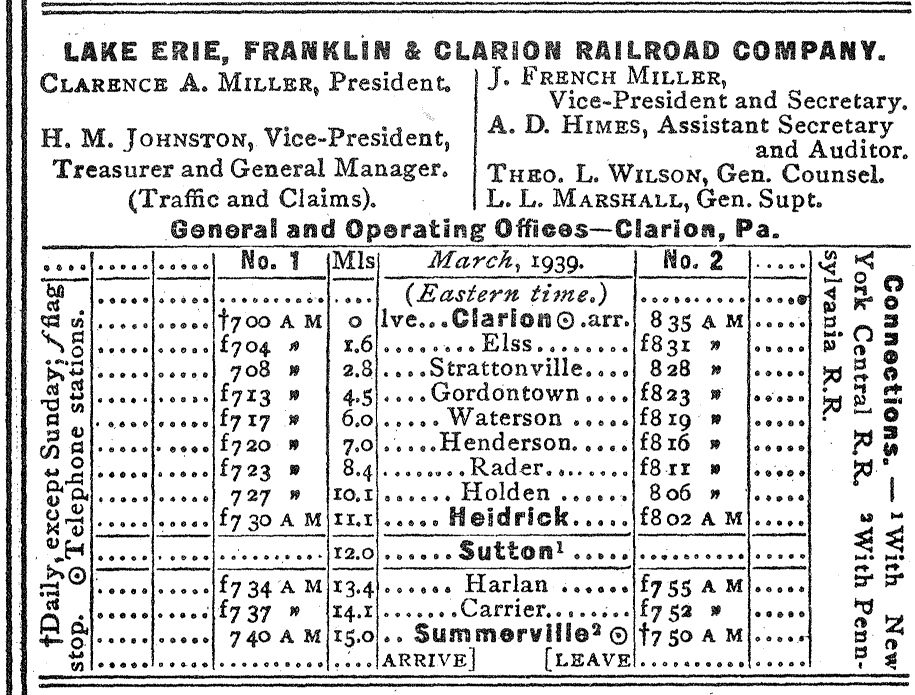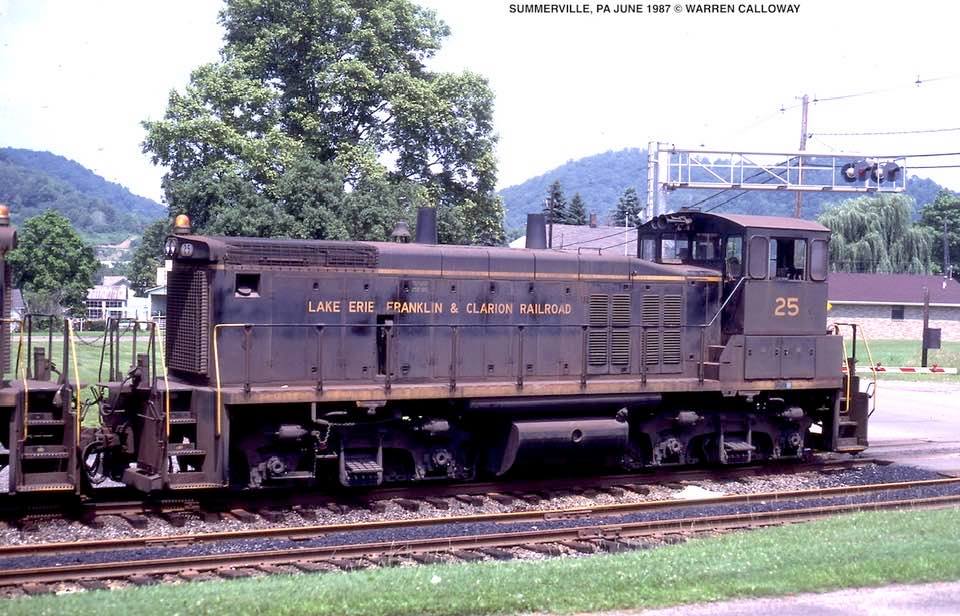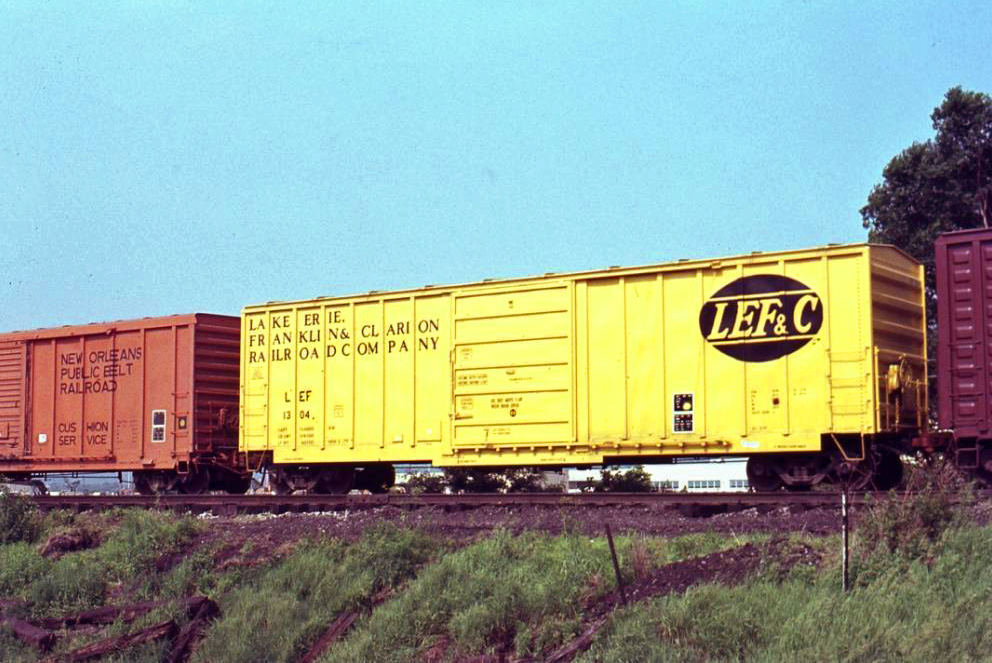Lake Erie, Franklin & Clarion Railroad (1877-1993)
Last revised: August 30, 2024
By: Adam Burns
For being such a small line the Lake Erie, Franklin & Clarion Railroad
(reporting marks, LEF) became somewhat well known in its later years as numerous freight
equipment from boxcars to hoppers
advertised the company's name and logo.
The LEF&C was based in Clarion, Pennsylvania and was first conceived in the late 19th century by lumber interests.
However, it wasn't long after the railroad opened that it found itself depending on the movement of coal, which was always a very important source of traffic for the company.
Over the years the short line survived on a mix of freight even during its later years. However, with the eventual loss of coal the railroad found itself struggling to make ends meet.
Finally, after nearly a century of service it called it quits in the early 1990s. Today, if one is lucky you can still find LEF&C-painted equipment in service, particularly east of the Mississippi.
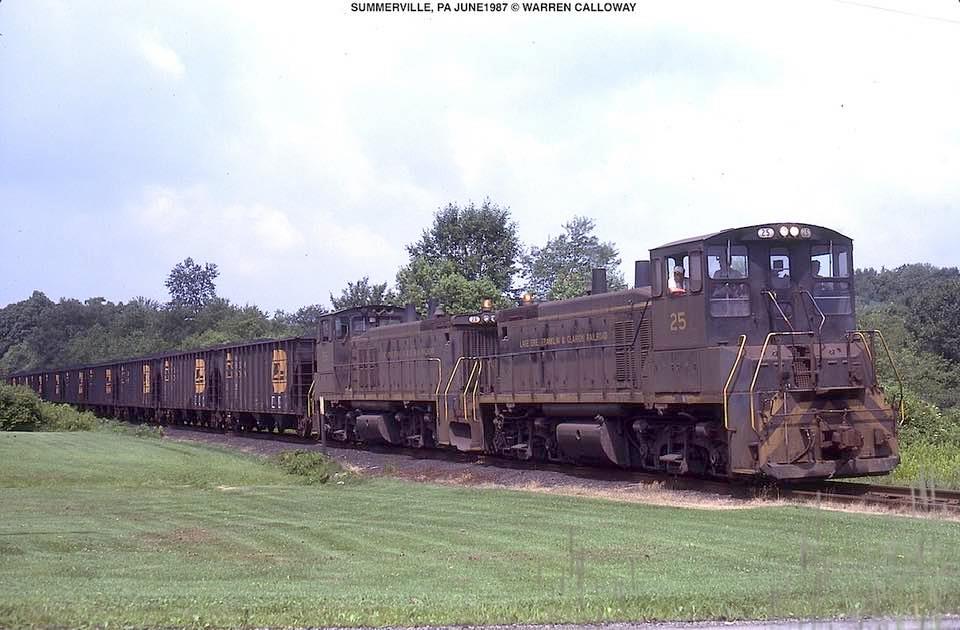 A pair of Lake Erie, Franklin & Clarion MP15DC's move a string of coal near Summerville, Pennsylvania in June, 1987. Warren Calloway photo.
A pair of Lake Erie, Franklin & Clarion MP15DC's move a string of coal near Summerville, Pennsylvania in June, 1987. Warren Calloway photo.Interestingly, at one time prior to the creation of the LEF&C the small town of Clarion, which lays along a river by the same name did have rail service, the narrow-gauge Emlenton, Shippenville, & Clarion Railroad.
The ES&C was an expensive proposition with heavy grades, tight curves, and many trestles which was chartered in June 1875, connecting Clarion with Knox (where it interchanged with the Buffalo, Rochester & Pittsburgh) two years later in the spring of 1877.
After a decade or so of service the roughly 10-mile line needed a heavier bridge crossing the Clarion River.
However, the town was unwilling to finance the project and as a result lost its only major transportation artery outside of the river.
As early as 1895 the town was mulling the idea of chartering and financing its own railroad, doing some preliminary surveying for a route between Clarion and Summerville.
In 1900 the Clarion & Summerville Railroad was chartered although a year later in 1901 it was renamed as the Clarion, Summerville & Pittsburgh.
Construction, however, did not begin for a few more years until 1903. By August 27, 1904 the line was opened, a distance of 15 miles and a connection with the Pennsylvania Railroad at Summerville as well as an interchange with the New York Central at Clarion.
The CS&P also built a four-mile branch from the main line at Strattonville (where it served a sawmill there) to Mill Creek. This branch provided the railroad with significant freight from raw logs (virgin pine, hemlock, and various hardwoods) to finished lumber.
Because of the route's shoddy construction, tight curves, and tough grades it utilized geared Shays to move logs down to the mill.
At the same time the route was opened it again changed names as the Pittsburgh, Summerville & Clarion. On December 31, 1910 the PS&C was acquired by Charles Miller through his small Pennsylvania Southern Railroad.
In 1912 yet another name change occurred as the Pittsburgh, Clarion & Franklin. Finally, on November 10, 1913 Miller decided to consolidate all three roads he controlled as the Lake Erie, Franklin and Clarion Railroad, with the lofty hopes of one day stretching northwestward to the lake via Franklin.
Unfortunately, this remained only a dream as the LEF&C never expanded beyond either of its original end points. The railroad, did, however radiate outward with small branches serving several coal mines the longest of which was the aforementioned Mill Creek line.
By the early 1920s the LEF&C had further "expanded" when it gained trackage rights over the New York Central to Franklin, primarily as a means of extending passenger service.
At the end of 1924 the NYC ended this practice, which returned to the short line to a 15-mile main line system. A year after losing its Franklin connection the LEF&C abandoned its Mill Creek branch.
In 1942 the railroad canceled its passenger trains altogether after the PRR had stopped running them through the Summersville interchange since without any connecting trains available travelers no longer saw a need to use the LEF&C.
Over the following decades little changed on the railroad except in 1949 when it began replacing its 2-8-0 Consolidations with diesel locomotives, first purchasing an Alco RS1 in April of that year, #20. This was followed in 1950 and 1951 with two more, #21-22.
Locomotive Roster
| Builder | Model Type | Road Number(s) | Notes | Quantity |
|---|---|---|---|---|
| Alco | RS1 | 20-21 | Acquired new, 1949-1950 | 2 |
| Alco | RS1 | 22 | Ex-M&StL #234/Nee-#951 | 1 |
| EMD | SW1500 | 23-24 | Acquired new, 1971-1972 | 2 |
| EMD | MP15DC | 25-28 | Acquired new, 1976-1979 | 4 |
Perhaps surprising given the Lake Erie, Franklin and Clarion Railroad's small size is that it remained a mostly profitable company from the 1920s onward except for the Great Depression years through 1935.
In its late era of operations its traffic consisted of brick, sand, glass, coal, and lumber. Additionally, it picked up new motive power in the 1970s which included two EMD SW1500s and later four, newer MP15DCs.
It was the loss of coal mines in the 1980s and early 1990s that severely hurt the railroad and finally forced it to shutdown.
The Interstate Commerce
Commission granted the abandonment on September 17, 1992 and the
railroad's final day of operations occurred on January 5, 1993.
Recent Articles
-
Amtrak Posts Record Ridership and Revenue in Fiscal Year 2025
Feb 24, 26 11:22 PM
Amtrak, the national passenger rail operator, has announced historic results for Fiscal Year 2025 (FY25), reporting the highest ridership and revenue in its history as demand for train travel across t… -
NC By Train Posts Busiest Month In 35-year History
Feb 24, 26 06:17 PM
North Carolina’s state-supported passenger rail service, marketed under the NC By Train brand, reached a milestone last fall. -
Northern Pacific 4-6-0 No. 1364 Returns To Life
Feb 24, 26 11:12 AM
The whistle of Northern Pacific steam returned to the Yakima Valley in a big way this month as Northern Pacific 4-6-0 No. 1364 moved under its own power for the first time in 73 years. -
CSX’s 2025 Santa Train: 83 Years of Holiday Cheer
Feb 24, 26 10:38 AM
On Saturday, November 22, 2025, CSX’s iconic Santa Train completed its 83rd annual run, again turning a working freight railroad into a rolling holiday tradition for communities across central Appalac… -
Alabama Murder Mystery Dinner Train Rides
Feb 24, 26 09:25 AM
There is currently one location in the state offering a murder mystery dinner experience, the Wales West Light Railway! -
Rhode Island Murder Mystery Dinner Train Rides
Feb 24, 26 09:21 AM
Let's dive into the enigmatic world of murder mystery dinner train rides in Rhode Island, where each journey promises excitement, laughter, and a challenge for your inner detective. -
Virginia Wine Tasting Train Rides
Feb 24, 26 09:20 AM
Wine tasting trains in Virginia provide just that—a unique experience that marries the romance of rail travel with the sensory delights of wine exploration. -
Tennessee Wine Tasting Train Rides
Feb 24, 26 09:17 AM
One of the most unique and enjoyable ways to savor the flavors of Tennessee’s vineyards is by train aboard the Tennessee Central Railway Museum. -
Southeast Wisconsin Eyes New Lakeshore Passenger Rail Link
Feb 23, 26 11:26 PM
Leaders in southeastern Wisconsin took a formal first step in December 2025 toward studying a new passenger-rail service that could connect Milwaukee, Racine, Kenosha, and Chicago. -
MBTA Sees Over 29 Million Trips in 2025
Feb 23, 26 11:14 PM
In a milestone year for regional public transit, the Massachusetts Bay Transportation Authority (MBTA) reported that its Commuter Rail network handled more than 29 million individual trips during 2025… -
Historic Blizzard Paralyzes the U.S. Northeast, Halts Rail Traffic
Feb 23, 26 05:10 PM
A powerful winter blizzard sweeping the northeastern United States on Monday, February 23, 2026, has brought transportation networks to a near standstill. -
Mt. Rainier Railroad Moves to Buy Tacoma’s Mountain Division
Feb 23, 26 02:27 PM
A long-idled rail corridor that threads through the foothills of Mount Rainier could soon have a new owner and operator. -
BNSF Activates PTC on Former Montana Rail Link Territory
Feb 23, 26 01:15 PM
BNSF Railway has fully implemented Positive Train Control (PTC) on what it now calls the Montana Rail Link (MRL) Subdivision. -
Cincinnati Scenic Railway To Acquire B&O GP30
Feb 23, 26 12:17 PM
The Cincinnati Scenic Railway, through an agreement with the Raritan Central Railway, to acquire former B&O GP30 #6923, currently lettered as RCRY #5. -
Texas Dinner Train Rides On The TSR
Feb 23, 26 11:54 AM
Today, TSR markets itself as a round-trip, four-hour, 25-mile journey between Palestine and Rusk—an easy day trip (or date-night centerpiece) with just the right amount of history baked in. -
Iowa Dinner Train Rides On The B&SV
Feb 23, 26 11:53 AM
If you’ve ever wished you could pair a leisurely rail journey with a proper sit-down meal—white tablecloths, big windows, and countryside rolling by—the Boone & Scenic Valley Railroad & Museum in Boon… -
North Carolina Wine Tasting Train Rides
Feb 23, 26 11:48 AM
A noteworthy way to explore North Carolina's beauty is by hopping aboard the Great Smoky Mountains Railroad and sipping fine wine! -
Nevada Wine Tasting Train Rides
Feb 23, 26 11:43 AM
While it may not be the first place that comes to mind when you think of wine, you can sip this delight by train in Nevada at the Nevada Northern Railway. -
Reading & Northern Surpasses 1M Tons Of Coal For 3rd Year
Feb 22, 26 11:57 PM
Reading & Northern Railroad (R&N), the largest privately owned railroad in Pennsylvania, has shipped more than one million tons of Anthracite coal for the third straight year. This was an impressive f… -
Minnesota's Northstar Commuter Rail Ends Service
Feb 22, 26 11:43 PM
Metro Transit has confirmed that Northstar service between downtown Minneapolis (Target Field Station) and Big Lake has ceased, with expanded bus service along the corridor beginning Jan. 5, 2026. -
Tri-Rail Sets New Ridership Record in 2025
Feb 22, 26 11:24 PM
South Florida’s commuter rail service Tri-Rail has achieved a new annual ridership milestone, carrying more than 4.5 million passengers in calendar year 2025. -
CSX Completes Major Upgrades at Willard Yard
Feb 22, 26 11:14 PM
In a significant boost to freight rail operations in the Midwest, CSX Transportation announced in January that it has finished a comprehensive series of infrastructure improvements at its Willard Yard… -
New Hampshire Wine Tasting Train Rides
Feb 22, 26 09:39 AM
This article details New Hampshire's most enchanting wine tasting trains, where every sip is paired with breathtaking views and a touch of adventure. -
New Jersey Wine Tasting Train Rides
Feb 22, 26 09:37 AM
If you're seeking a unique outing or a memorable way to celebrate a special occasion, wine tasting train rides in New Jersey offer an experience unlike any other. -
Nevada Murder Mystery Dinner Train Rides
Feb 22, 26 09:36 AM
Seamlessly blending the romance of train travel with the allure of a theatrical whodunit, these excursions promise suspense, delight, and an unforgettable journey through Nevada’s heart. -
West Virginia Murder Mystery Dinner Train Rides
Feb 22, 26 09:34 AM
For those looking to combine the allure of a train ride with an engaging whodunit, the murder mystery dinner trains offer a uniquely thrilling experience. -
New York Central 4-8-2 #3001 To Be Restored
Feb 22, 26 12:29 AM
New York Central 4-8-2 No. 3001—an L-3a “Mohawk”—is the centerpiece of a major operational restoration effort being led by the Fort Wayne Railroad Historical Society (FWRHS) and its American Locomotiv… -
Norfolk Southern To Buy 40 New Wabtec ES44ACs
Feb 21, 26 11:52 PM
Norfolk Southern has announced it will acquire 40 brand-new Wabtec ES44AC locomotives, marking the Class I railroad’s first purchase of new locomotives since 2022. -
CPKC To Buy 65 New Progress Rail SD70ACe-T4s
Feb 21, 26 11:28 PM
Canadian Pacific Kansas City (CPKC) is moving to refresh and expand its road fleet with a new-build order from Progress Rail, announcing an agreement for 65 EMD SD70ACe-T4 Tier 4 diesel-electric freig… -
Ohio Rail Commission Approves Two Projects
Feb 21, 26 11:09 PM
At its January 22 bi-monthly meeting, the Ohio Rail Development Commission approved grant funding for two rail infrastructure projects that together will yield nearly $400,000 in investment to improve… -
CSX Completes Avon Yard Hump Lead Extension
Feb 21, 26 03:38 PM
CSX says it has finished a key infrastructure upgrade at its Avon Yard in Indianapolis, completing the “cutover” of a newly extended hump lead that the railroad expects will improve yard fluidity. -
Pinsly Restores Freight Service On Alabama Short Line
Feb 21, 26 12:55 PM
After more than a year without trains, freight rail service has returned to a key industrial corridor in southern Alabama. -
Phoenix City Council Pulls the Plug on Capitol Light Rail Extension
Feb 21, 26 12:19 PM
In a pivotal decision that marks a dramatic shift in local transportation planning, the Phoenix City Council voted to end the long-planned Capitol light rail extension project. -
Norfolk Southern Unveils Advanced Wheel Integrity System
Feb 21, 26 11:06 AM
In a bid to further strengthen rail safety and defect detection, Norfolk Southern Railway has introduced a cutting-edge Wheel Integrity System, marking what the Class I carrier calls a significant bre… -
CPKC Sets New January Grain-Haul Record
Feb 21, 26 10:31 AM
Canadian Pacific Kansas City (CPKC) says it has opened 2026 with a new benchmark in Canadian grain transportation, announcing that the railway moved a record volume of grain and grain products in Janu… -
New Documentary Charts Iowa Interstate's History
Feb 21, 26 12:40 AM
A newly released documentary is shining a spotlight on one of the Midwest’s most distinctive regional railroads: the Iowa Interstate Railroad (IAIS). -
LA Metro’s A Line Extension Study Forecasts $1.1B in Economic Output
Feb 21, 26 12:38 AM
The next eastern push of LA Metro’s A Line—extending light-rail service beyond Pomona to Claremont—has gained fresh momentum amid new economic analysis projecting more than $1.1 billion in economic ou… -
Age of Steam Acquires B&LE 2-10-4 No. 643 (2025)
Feb 21, 26 12:33 AM
When the Age of Steam Roundhouse Museum rolled out B&LE 2-10-4 No. 643 for public viewing in 2025, it wasn’t simply a new exhibit debuting under roof—it was the culmination of one of preservation’s lo… -
NCDOT Study: Restoring Asheville Passenger Rail Offers Economic Lift
Feb 21, 26 12:26 AM
A revived passenger rail connection between Salisbury and Asheville could do far more than bring trains back to the mountains for the first time in decades could offer considerable economic benefits. -
Brightline Unveils ‘Freedom Express’ To Commemorate America’s 250th
Feb 20, 26 11:36 AM
Brightline, the privately operated passenger railroad based in Florida, this week unveiled its new Freedom Express train to honor the nation's 250th anniversary. -
Age of Steam Roundhouse Adds C&O No. 1308
Feb 20, 26 10:53 AM
In late September 2025, the Age of Steam Roundhouse Museum in Sugarcreek, Ohio, announced it had acquired Chesapeake & Ohio 2-6-6-2 No. 1308. -
Reading & Northern Announces 2026 Excursions
Feb 20, 26 10:08 AM
Immediately upon the conclusion of another record-breaking year of ridership in 2025, the Reading & Northern Passenger Department has already begun its 2026 schedule of all-day rail excursion. -
Siemens Mobility Tapped To Modernize Tri-Rail Fleet
Feb 20, 26 09:47 AM
South Florida’s Tri-Rail commuter service is preparing for a significant motive-power upgrade after the South Florida Regional Transportation Authority (SFRTA) announced it has selected Siemens Mobili… -
Reading T-1 No. 2100 Restoration Progress
Feb 20, 26 09:36 AM
One of the most famous survivors of Reading Company’s big, fast freight-era steam—4-8-4 T-1 No. 2100—is inching closer to an operating debut after a restoration that has stretched across a decade and… -
C&O Kanawha No. 2716: A Third Chance at Steam
Feb 20, 26 09:32 AM
In the world of large, mainline-capable steam locomotives, it’s rare for any one engine to earn a third operational career. Yet that is exactly the goal for Chesapeake & Ohio 2-8-4 No. 2716. -
Missouri Wine Tasting Train Rides
Feb 20, 26 09:29 AM
The fusion of scenic vistas, historical charm, and exquisite wines is beautifully encapsulated in Missouri's wine tasting train experiences. -
Minnesota Wine Tasting Train Rides
Feb 20, 26 09:26 AM
This article takes you on a journey through Minnesota's wine tasting trains, offering a unique perspective on this novel adventure. -
Kansas Murder Mystery Dinner Train Rides
Feb 20, 26 09:23 AM
Kansas, known for its sprawling wheat fields and rich history, hides a unique gem that promises both intrigue and culinary delight—murder mystery dinner trains. -
Florida Murder Mystery Dinner Train Rides
Feb 20, 26 09:20 AM
Florida, known for its vibrant culture, dazzling beaches, and thrilling theme parks, also offers a unique blend of mystery and fine dining aboard its murder mystery dinner trains. -
NC&StL “Dixie” No. 576 Nears Steam Again
Feb 20, 26 09:15 AM
One of the South’s most famous surviving mainline steam locomotives is edging closer to doing what it hasn’t done since the early 1950s, operate under its own power.

